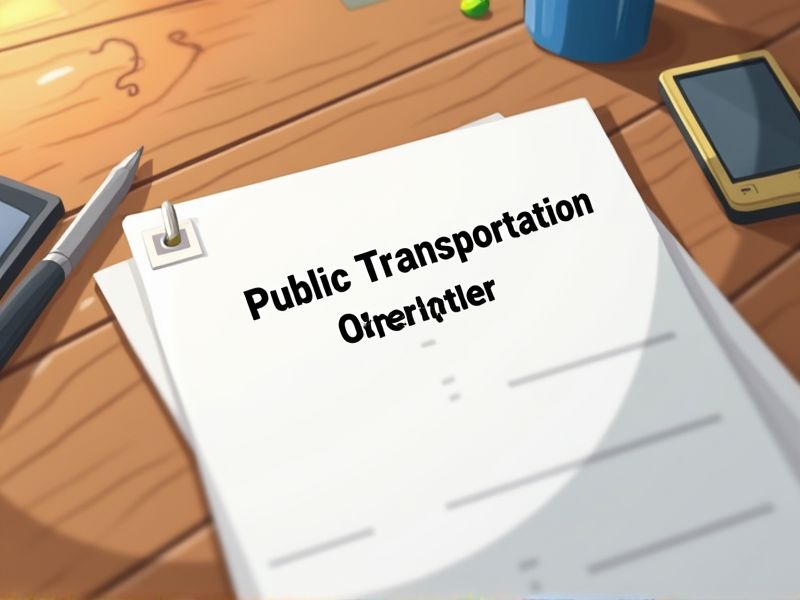
Public transportation operators play a vital role in ensuring safe and efficient travel for millions, requiring a high level of responsibility and skill. Certain certifications are essential to verify their knowledge in vehicular operation, safety protocols, and emergency response. These credentials help standardize practices, ensuring compliance with safety regulations and enhancing public trust. Here are some important certifications necessary for public transportation operators.
Commercial Driver's License (CDL) with Passenger Endorsement
A Commercial Driver's License (CDL) with a Passenger Endorsement is required to ensure operators have the skills and knowledge necessary to safely transport passengers. This endorsement entails additional testing focused on passenger safety and handling of passenger-carrying vehicles, which mitigates risks during transit. Federal and state regulations mandate this certification to uphold public safety and maintain standardized transportation practices. Public transportation operators without this endorsement risk non-compliance with legal requirements, leading to potential penalties and increased liability.
Public Transportation Operator Certification
The requirement for Public Transportation Operator Certification arises from the need to ensure passenger safety by verifying that operators possess essential skills and knowledge. Certified operators tend to reduce instances of accidents and operational errors, as they adhere to standardized protocols. Certification also builds public trust, encouraging more people to use public transportation, boosting overall system efficiency. Lastly, it aligns operators with regulatory compliance, thereby minimizing legal issues for transportation authorities.
Defensive Driving Certification
Public transportation operators face dense traffic environments that increase accident risk, so a Defensive Driving Certification equips them with skills to anticipate hazards. A certification emphasizes safe practices, reducing potential liabilities for employers. Operators trained in defensive driving can effectively manage unexpected scenarios, enhancing passenger safety. Employers adopting such training can improve public confidence, potentially increasing ridership.
First Aid and CPR Certification
Public transportation operators encounter medical emergencies, making First Aid and CPR certification essential for immediate and effective response. Certification enhances passenger safety by equipping operators with skills to handle situations like cardiac arrest or injuries during transit. In the event of an emergency, timely intervention by a trained operator can stabilize a situation until professional medical help arrives. Offering such training often complies with safety regulations and can reduce legal liabilities for transportation companies.
Hazardous Materials (HazMat) Endorsement
Hazardous Materials Endorsement ensures that public transportation operators are adequately trained to handle hazardous substances safely, reducing potential risks to public health and the environment. It mandates strict safety protocols which can mitigate the impact of accidents involving hazardous materials. Regulatory compliance with state and federal guidelines is achieved, thus avoiding legal penalties for both the operator and the transportation company. Enhanced knowledge and skills from the endorsement also improve the operator's ability to respond effectively during emergencies, ensuring the safety of passengers and cargo.
OSHA Workplace Safety Certification
Public transportation operators face risks like vehicular accidents and passenger-related incidents, so OSHA Workplace Safety Certification ensures they understand and can mitigate these hazards. Compliance with OSHA standards helps operators reduce accidents and resulting costs, leading to more efficient operations. Certification helps build public trust in the safety of transportation services, potentially increasing usage. Proper training can further lead to a decrease in workers' compensation claims by equipping operators with risk management skills.
Emergency Response Training Certification
Emergency Response Training Certification ensures that public transportation operators are equipped to handle critical situations effectively, reducing the risk of injury or fatalities during emergencies. Proper training enables operators to maintain calm and coordinate with emergency services swiftly, minimizing potential service disruptions. Knowledge of emergency protocols and procedures helps protect passengers, thereby enhancing public confidence in using public transportation systems. Equipping operators with these skills can lead to quicker resolution of emergency incidences, thereby optimizing operational safety and efficiency.
Driver Safety Evaluation Certification
Driver Safety Evaluation Certification is essential for public transportation operators because it ensures drivers possess the necessary skills and knowledge to operate vehicles safely, which reduces the risk of accidents. By mandating certification, transportation agencies can maintain high standards of safety, promoting trust among passengers. Evaluated drivers also demonstrate compliance with legal and regulatory requirements, safeguarding operators from potential liabilities. The certification process continuously reinforces best practices, fostering a culture of safety within the organization.
Customer Service Excellence Certification
Customer Service Excellence Certification enhances public trust in a transportation operator by ensuring consistent and high-quality interactions. When employees are trained to meet specific service standards, passenger satisfaction levels tend to increase, leading to higher ridership and revenue. Certification can reduce the number of complaints and incidents, as employees are more skilled in handling diverse customer interactions effectively. Public operators with this certification are perceived as more reliable and committed to passenger welfare, which can improve overall community standing.
Conflict Resolution and Communication Skills Certification
Public transportation operators encounter diverse passengers, and conflict resolution skills help address disputes efficiently. Effective communication ensures clearer instructions and enhances passenger safety. Certification instills confidence and standardizes the response to emergencies or conflicts. Better handling of challenging situations can improve overall passenger satisfaction and trust in public transit systems.
Summary
You can expect improved service quality as certifications standardize performance and reliability. Enhanced safety measures will likely prioritize passenger security, fostering trust. Your experience might become more efficient due to better operational practices aligned with certification mandates. Access to grants and funding could enable expanded services or upgraded infrastructure, benefiting your transit options.
